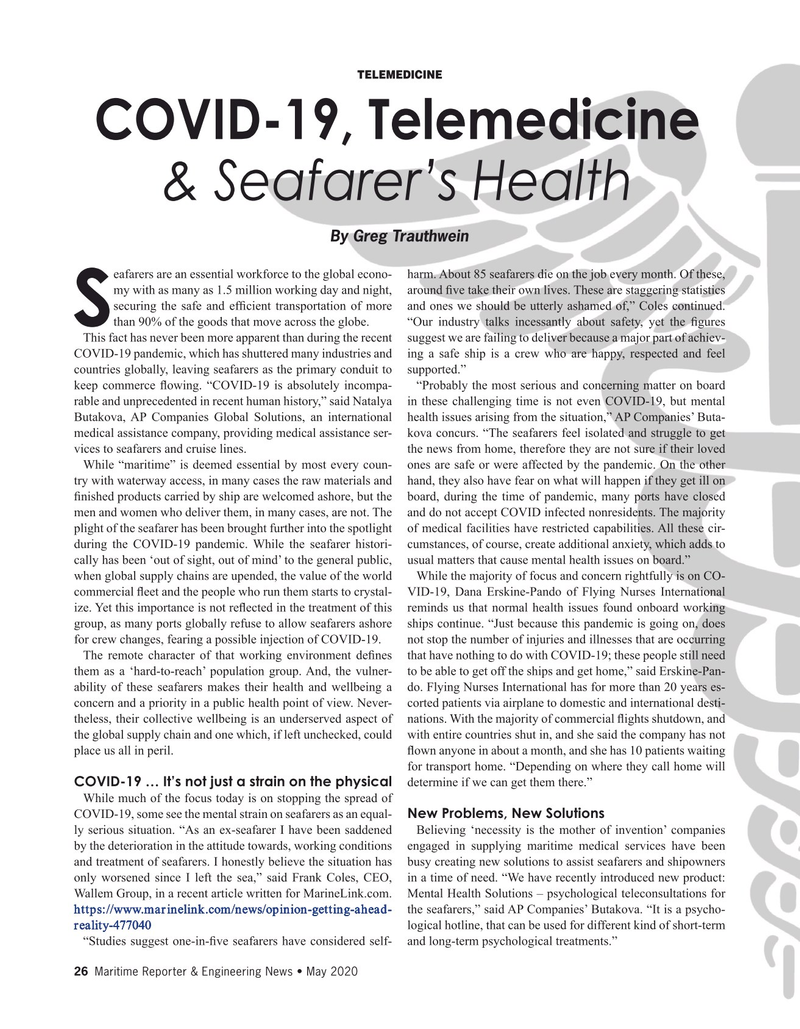
Page 26: of Maritime Reporter Magazine (May 2020)
Fleet Management
Read this page in Pdf, Flash or Html5 edition of May 2020 Maritime Reporter Magazine
Telemedicine
COVID-19, Telemedicine & Seafarer’s Health
By Greg Trauthwein eafarers are an essential workforce to the global econo- harm. About 85 seafarers die on the job every month. Of these, my with as many as 1.5 million working day and night, around fve take their own lives. These are staggering statistics securing the safe and effcient transportation of more and ones we should be utterly ashamed of,” Coles continued.
Sthan 90% of the goods that move across the globe. “Our industry talks incessantly about safety, yet the fgures
This fact has never been more apparent than during the recent suggest we are failing to deliver because a major part of achiev-
COVID-19 pandemic, which has shuttered many industries and ing a safe ship is a crew who are happy, respected and feel countries globally, leaving seafarers as the primary conduit to supported.” keep commerce fowing. “COVID-19 is absolutely incompa- “Probably the most serious and concerning matter on board rable and unprecedented in recent human history,” said Natalya in these challenging time is not even COVID-19, but mental
Butakova, AP Companies Global Solutions, an international health issues arising from the situation,” AP Companies’ Buta- medical assistance company, providing medical assistance ser- kova concurs. “The seafarers feel isolated and struggle to get vices to seafarers and cruise lines. the news from home, therefore they are not sure if their loved
While “maritime” is deemed essential by most every coun- ones are safe or were affected by the pandemic. On the other try with waterway access, in many cases the raw materials and hand, they also have fear on what will happen if they get ill on fnished products carried by ship are welcomed ashore, but the board, during the time of pandemic, many ports have closed men and women who deliver them, in many cases, are not. The and do not accept COVID infected nonresidents. The majority plight of the seafarer has been brought further into the spotlight of medical facilities have restricted capabilities. All these cir- during the COVID-19 pandemic. While the seafarer histori- cumstances, of course, create additional anxiety, which adds to cally has been ‘out of sight, out of mind’ to the general public, usual matters that cause mental health issues on board.” when global supply chains are upended, the value of the world While the majority of focus and concern rightfully is on CO- commercial feet and the people who run them starts to crystal- VID-19, Dana Erskine-Pando of Flying Nurses International ize. Yet this importance is not refected in the treatment of this reminds us that normal health issues found onboard working group, as many ports globally refuse to allow seafarers ashore ships continue. “Just because this pandemic is going on, does for crew changes, fearing a possible injection of COVID-19. not stop the number of injuries and illnesses that are occurring
The remote character of that working environment defnes that have nothing to do with COVID-19; these people still need them as a ‘hard-to-reach’ population group. And, the vulner- to be able to get off the ships and get home,” said Erskine-Pan- ability of these seafarers makes their health and wellbeing a do. Flying Nurses International has for more than 20 years es- concern and a priority in a public health point of view. Never- corted patients via airplane to domestic and international desti- theless, their collective wellbeing is an underserved aspect of nations. With the majority of commercial fights shutdown, and the global supply chain and one which, if left unchecked, could with entire countries shut in, and she said the company has not place us all in peril. fown anyone in about a month, and she has 10 patients waiting for transport home. “Depending on where they call home will
COVID-19 … It’s not just a strain on the physical determine if we can get them there.”
While much of the focus today is on stopping the spread of
New Problems, New Solutions
COVID-19, some see the mental strain on seafarers as an equal- ly serious situation. “As an ex-seafarer I have been saddened Believing ‘necessity is the mother of invention’ companies by the deterioration in the attitude towards, working conditions engaged in supplying maritime medical services have been and treatment of seafarers. I honestly believe the situation has busy creating new solutions to assist seafarers and shipowners only worsened since I left the sea,” said Frank Coles, CEO, in a time of need. “We have recently introduced new product:
Wallem Group, in a recent article written for MarineLink.com. Mental Health Solutions – psychological teleconsultations for https://www.marinelink.com/news/opinion-getting-ahead- the seafarers,” said AP Companies’ Butakova. “It is a psycho- reality-477040 logical hotline, that can be used for different kind of short-term “Studies suggest one-in-fve seafarers have considered self- and long-term psychological treatments.” 26 Maritime Reporter & Engineering News • May 2020

 25
25

 27
27
